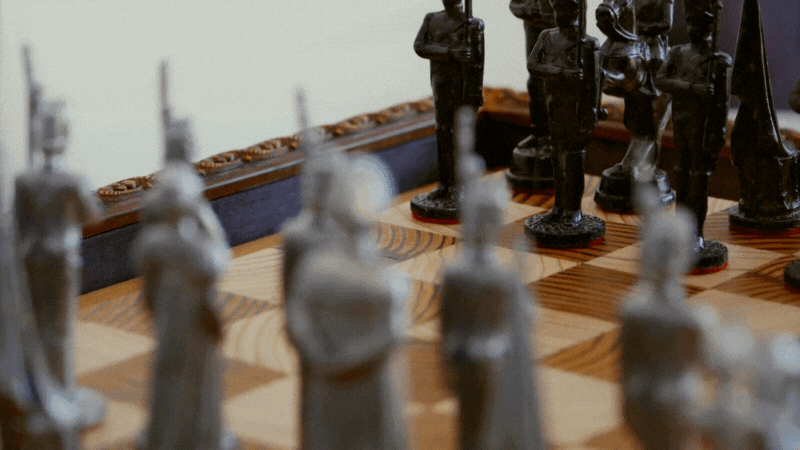READ TIME: 10m
DR JOHN DEMARTINI - Updated 2 years ago
If you pay close attention to the mass media, you'll probably notice frequent use of highly polarized sensationalism. At present, there are numerous high polarities concerning war and peace issues, particularly in the Middle East, Ukraine and Russia.
While similar events occur in other parts of the world, they may not necessarily make it to the media because the spotlight tends to be on what provokes public interest, shock or excitement.
In essence, the media tends to focus most on what grabs attention and commercially sells. As such, it’s not surprising that the Ukrainian and Russian conflict has mostly recently taken a back seat to the Israeli and Palestinian war which currently garners more media attention.
Over the past 51 years of research and focus on human behavior, I have observed similar patterns in collective society as I do in individuals.
This may be valuable in helping you understand the Law of Eristic Escalation, which is a principle found in chaos theory, which proposes that the more someone tries to impose what they believe to be order, the stronger the escalation of an equal but opposite behavior chaos ensues.
Every human being, including you has a set of priorities, a set of highest to lower values that influences how they and you filter reality, make perceptions, decisions and take actions.
- Whenever you’re living congruently with your highest values or priorities, your blood, glucose, and oxygen go into your FOREBRAIN or executive center.
- Whenever you’re attempting to live according to your lower values, and you end up in a more unfulfilled and survival oriented mode, your blood, glucose, and oxygen go into your subcortical AMYGDALA or desire center.
In other words, when you live by higher priority, engage in deeply meaningful activities and achieve your true objective goals, you tend to become more stable, less volatile, and more fulfilled. You are more positioned to withstand emotional challenges without succumbing to over or under reactive responses.
However, when you feel that you’re not fulfilling your higher objectives and lack fulfillment, you tend to activate a more primitive amygdala response in the subcortical area of your brain that is associated with survival.
Think of a day at work when you prioritized your actions, stayed on priority, felt inspired, and got everything done on your agenda. You likely come home feeling on top of the world, even in the face of chaos, because you're still operating within your executive function.
On the other hand, if your workday was filled with challenges, and you perceived no progress on your agenda, you were more likely to come home feeling emotionally reactive and likely to experience extreme volatility.
The same dynamics occur in societies collectively. When a country or its people feel they're fulfilling objectives, achieving chief aims, and expressing gratitude for life, they tend to become more resilient and adaptable to changes and challenges.
On the other hand, when you are unfulfilled and believe you are not achieving what's meaningful, you are more likely to become emotional and angry. This emotional state is associated with your amygdala, often accentuating your subjective bias, further misinterpretating your sensory information, and reacting rather than proacting responses.
There are two types of thinking processes at play here. Systems 1 thinking involves an emotional reaction before you think, while systems 2 thinking entails objective thinking before reacting.

At the moment, and within this particular political climate, there's a noticeable emotional reaction with less rational thinking. Many people appear to be reacting impulsively and instinctively, creating fantasies of world peace and nightmares of war. The high polarization, coupled with subjective bias, often results in thoughtless decision-making.
In collective societies, the majority tends to be a bit more neutral. In places like Palestine and Israel, the majority of people, whether Palestinian or Israeli, tend to coexist peacefully. However, there are generally a few individuals who are more radical, leaning toward emotional responses and systems 1 thinking. These outspoken individuals tend to be the ones that usually grab attention in the media because sensationalism and more extreme polarities sell.
I experienced this when I lived in New York in the '90s when there was an Iranian controversy. My wife and I were strolling down Madison Avenue and we saw a local TV station interviewing people about the Central Park demonstrations related to the Iranian controversy. Dolph Lundgren and his wife, who lived next door, were walking in front of us and were interviewed. I personally perceived that Dolph presented a rational, reasonable, and objective viewpoint.
Then, they interviewed me, and I shared what I thought was sensible information. Subsequently, a disheveled individual approached, drinking from a bottle in a paper bag, and they interviewed him. He expressed volatile sentiments, saying, "nuke them all." To my surprise, when we saw the news broadcast that night, neither Dolph nor I were featured, but the wild guy was.
This was a powerful reminder that sensationalism sells and captures attention. And, when people watch this sensationalist news, they often perceive media content as reality instead of examining it further.
On average, individuals from Israel and Palestine are loving individuals trying to raise families, survive, and progress in life. Many of them are even friends with their neighbors. However there are a few extreme individuals who are more polarized and volatile. Politicians who are elected by these polarized groups are then in a position where they are required to walk the talk and fulfil their promises to these people, which sometimes results in escalation.
This situation aligns with the Law of Eristic Escalation that I mentioned above.
The Law of Eristic Escalation, which holds particular significance in chaos theory, becomes apparent when an individual, often an ideologue with a proud, individualized and often narcissistic perspective on what they perceive should be done, projects their biased views.
This projection often initiates a counterbalancing effect from people with an opposing bias. The more entrenched one side becomes in their perspective, operating from an amygdala response or systems 1 thinking, the stronger the opposing bias tends to become. This escalation process can lead from minor conflicts to more significant confrontations, possibly evolving into a global scale.
As the escalation unfolds, rationality tends to take a back seat to more irrational subjective bias, with few displays of executive function to moderate the situation. Individuals, when caught in this spiral, can more easily lose control and veer off balance.
Collective societies, much like individuals, can easily lose control and spiral into high polarities.
Governments, similar to individuals, can deviate from their executive function, activating their amygdala, succumbing to subjective bias, projecting values onto others, and engaging in black-and-white thinking of “I’m good and they’re bad”.

The ensuing battles can serve as a valuable feedback mechanism that they are not simultaneously acknowledging both sides.
In philosophy, there’s something called a dialectic approach, where opposing propositions aim for synthesis instead of winning a debate or argument. In this way, both sides can learn a little from each other, perhaps change their view and come to a synthesis of the two opposing propositions.
This is a wiser and more constructive approach to handling conflicts than looking for a I-win-you-lose outcome as it is grounded in the executive function of the brain and promotes growth through understanding and listening.
In my signature 2-day Breakthrough Experience program, I teach a scientific process known as the Demartini Method. When using the method, I hold people accountable by asking, "What specific trait, action, or inaction do you perceive this individual displaying or demonstrating that you despise most?" I then guide you to see all the moments when you perceive yourself exhibiting the same behavior to the same degree until you see with certainty that what you see in them you do too.
This process extends beyond individual experiences to collective ones. When one group clashes with another, questioning where such behavior exists within your collective group can reveal uncomfortable truths. If you're honest and set aside your pride, you'll discover that both sides have engaged in similar actions - each teaching the other a valuable lesson.
As I often say, you tend to only resent things on the outside that represent parts of yourself that you’re ashamed of. As such, you tend to dissociate from what you’re ashamed of, go into pride, and pretend you’re too proud to admit what you see in them is inside of you.
The principles of sociology reflect social individuality, and my advice for navigating conflicts is grounded in individual actions.
As an individual, you have the power to teach through exemplification. If you govern yourself and moderate emotional escalation and refrain from taking exaggerated sides, you contribute to resolving the current form of conflicts.
Maximum growth occurs at the border of support and challenge. By calming your polarized emotions and encouraging others to do the same, you can assist in finding objective solutions and seeing both sides of the conflict.
Being solution-oriented involves recognizing both perspectives, while a problem-oriented approach focuses on only one side, often due to missing information or subjective bias or prejudice.
Remember, the greatest teacher is exemplification. By embodying stability, being open to both sides, and acknowledging the shared humanity of everyone involved, you contribute to a transformation.
It is wise to also look deeper before labeling people, whether Palestinians, Israelis, Russians, or Ukrainians, and instead recognize their shared humanity and the challenges they face.

In conclusion, authenticity is compromised in moments of pride or shame, while being governed and loving allows your true authenticity to shine through.
It is wise to consider this when taking sides and pointing finger, and to reflect on your contribution to the escalation.
Governing yourself contributes to creating a ripple effect, fostering love and self-governance in others. Keep in mind that behind labels, everyone is a human being striving to fulfill their lives. And, be wary of media sensationalism, which often sells polarities rather than objective truths.
To Sum Up
- Media Sensationalism: You'll likely notice that today's media landscape is often dominated by sensationalism, especially in war and peace issues. The focus tends to shift based on what grabs the most attention, like how the Ukrainian and Russian conflicts took a back seat to the Israeli and Palestinian wars.
- Human Behavior Patterns: Both at an individual and societal level, you can observe similar behavior patterns. The amygdala response in the lower subcortical area of the brain mostly leads to subjective bias and reactive behaviors.
- Thinking Processes (systems 1 vs 2 thinking): High levels of polarization and subjective bias contribute to impulsive decision-making (systems 1 thinking) instead of objective, balanced, neutral, and thoughtful responses (systems 2 thinking).
- Collective Dynamics: In collective societies, you'll tend to find a majority of individuals in a state of greater neutrality, yet attention-grabbing individuals, often radical and emotional, dominate media coverage. The Law of Eristic Escalation shows how biases and ideologies can escalate conflicts and their counterbalancing peace demonstrations.
- Navigating Conflicts: Your individual actions play a pivotal role in resolving conflicts. By exemplifying and regulating your polarized emotions, you can contribute to societal change. Recognizing both perspectives and moderating one-sided approaches helps to foster a solution-oriented mindset, promoting greater understanding and growth.
- Authenticity and Humility: In moments of pride or shame, your authenticity becomes compromised, while love allows your true authenticity to shine through. It is wise to emphasize what is common and shared within humanity and reconsider projecting polarized labels that can contribute to conflict de-escalation, thereby highlighting the importance of the balance of humility and pride.
- Media Caution: It is wise to be aware of media sensationalism, as it often sells polarities rather than objective truths. It's a reminder to be astute enough to not be persuaded by biased media narratives and seek genuine understanding beyond sensationalized content.
- Empower Your Life: The Breakthrough Experience is a 2-day seminar that I present where I introduce people to the Demartini Method. It’s where I’ll share information with you that will help you to wake up the true power of your governed mind, which is the key to mastering your life. Join me at the seminar to learn how to master your mind, dissolve your fears and build a life that’s centered on fulfilling your inspired purpose more than over reacting to misinformation.
Are you ready for the NEXT STEP?
If you’re seriously committed to your own growth, if you’re ready to make a change now and you’d love some help doing so, then click on the LIVE chat button bottom right of your screen and chat to us now.
Alternatively, you can book a FREE Discovery call with a member of the Demartini Team.
Interested in the Breakthrough Experience seminar?
If you’re ready to go inwards and do the work that will clear your blockages, clarify your vision and balance your mind, then you’ve found the perfect place to start with Dr Demartini at the Breakthrough Experience.
In 2 days you’ll learn how to solve any issue you are facing and reset the course of your life for greater achievement and fulfillment.
Click HERE to find out more
Important Notice:
The content shared in this blog is for education and personal development. It is not intended to diagnose, treat, cure, or prevent any psychological or medical conditions. The information and processes shared are for general educational purposes only and should not be considered a substitute for professional mental-health or medical advice. If you are experiencing acute distress or ongoing clinical concerns, please consult a licensed health-care provider.
Read full disclaimer HERE









